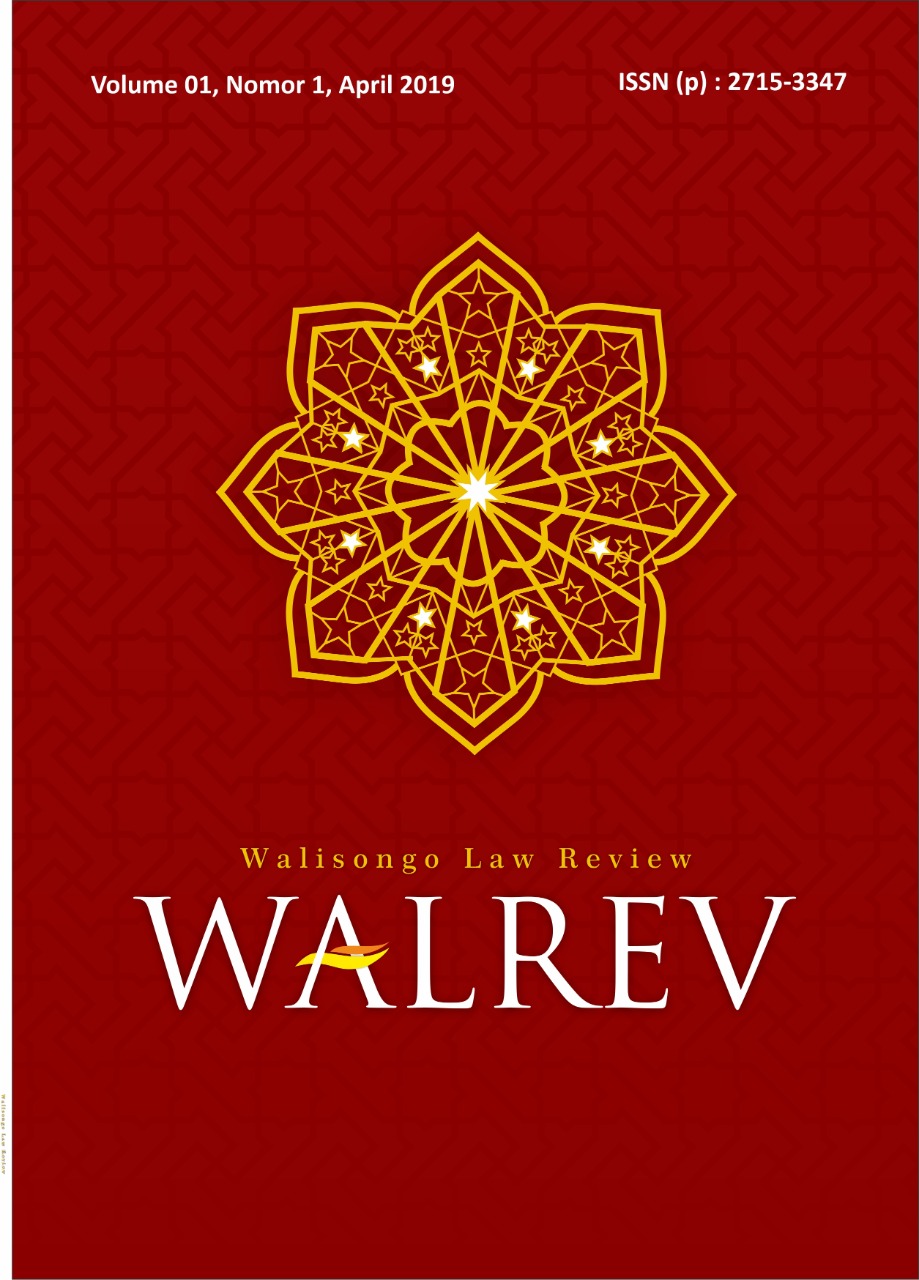Identity Politics in the Construction of Electoral Laws: A Qualitative Analysis
DOI:
https://doi.org/10.21580/walrev.2023.5.2.14414Keywords:
Politics Identity, Construction, Election.Abstract
This article examines the construction of electoral regulations in Indonesia concerning representational and identity politics. Although Law No. 7 of 2017 on General Elections governs electoral processes to safeguard national identity and interests, gaps remain in addressing the legal dimensions of identity politics. This study aims to analyze how identity politics is constructed within Indonesia’s electoral law and to assess the extent to which these laws accommodate the principle of representation without fostering identity-based discrimination. Employing a non-doctrinal research method with a normative approach, this study utilizes documentation and literature analysis as its primary data sources. The findings reveal that electoral regulations are designed to make elections an instrument for protecting national identity and interests. While the Election Law does not explicitly incorporate regional, ethnic, or religious representation, its implementation reflects the influence of specific legal arrangements, such as those governing the Special Autonomy of Papua Province, the Aceh Government, and the Special Region of Yogyakarta. These special regulations provide limited space for representational politics based on regional, cultural, and religious affiliations. Furthermore, electoral regulations prohibit various campaign practices that may evoke or exploit identity politics. This study contributes to a deeper understanding of the dynamics between representation and identity politics within the legal framework of Indonesia’s electoral system.
Artikel ini mengkaji konstruksi peraturan perundang-undangan pemilu di Indonesia dalam kaitannya dengan politik representasi dan politik identitas. Meskipun Undang-Undang No. 7 Tahun 2017 tentang Pemilihan Umum mengatur penyelenggaraan pemilu untuk menjaga identitas dan kepentingan nasional, masih terdapat kesenjangan dalam pengaturan dimensi hukum terkait politik identitas. Penelitian ini bertujuan untuk menganalisis bagaimana politik identitas dikonstruksikan dalam hukum pemilu Indonesia serta menilai sejauh mana regulasi pemilu mengakomodasi prinsip representasi tanpa menimbulkan diskriminasi berbasis identitas. Dengan menggunakan metode penelitian non-doktrinal melalui pendekatan normatif, penelitian ini memanfaatkan studi dokumentasi dan kepustakaan sebagai sumber data utama. Hasil penelitian menunjukkan bahwa regulasi pemilu dirancang untuk menjadikan pemilu sebagai instrumen dalam melindungi identitas dan kepentingan nasional. Meskipun Undang-Undang Pemilu tidak secara eksplisit memuat unsur representasi berdasarkan daerah, etnis, atau agama, implementasinya dipengaruhi oleh pengaturan khusus seperti Otonomi Khusus Provinsi Papua, Pemerintahan Aceh, dan Daerah Istimewa Yogyakarta. Pengaturan khusus tersebut memberikan ruang terbatas bagi praktik politik representasi berbasis daerah, budaya, dan agama. Selain itu, regulasi pemilu juga melarang berbagai bentuk kegiatan kampanye yang berpotensi menimbulkan atau mengeksploitasi politik identitas. Artikel ini berkontribusi dalam memperdalam pemahaman mengenai dinamika antara representasi dan politik identitas dalam kerangka hukum sistem pemilu di Indonesia.
Keywords: General Election; Identity Politics; Legal Construction; Electoral Law.
Downloads
References
Alabi, Abdullahi, Mubarak SulaimanJamiu, and Abdulmuthalib Akinkunmi. 2023. “Identity Politics and Its Implication on the Nigerian Electoral Process.” African Journal of Politics and Administrative Studies 16(1):201–13. doi: 10.4314/ajpas.v16i1.12.
Anon. 2022. “Jokowi Ke Capres Cawapres Hindari Politik Identitas Sangat Berbahaya.” Kompas.Com. Retrieved (https://nasional.kompas.com/read/2022/11/21/12150101/jokowi-ke-capres-cawapres-hindari-politik-identitas-sangat-berbahaya).
Corrias, Luigi. 2016. “Populism in a Constitutional Key: Constituent Power, Popular Sovereignty and Constitutional Identity.” European Constitutional Law Review 12(1):6–26. doi: 10.1017/S1574019616000031.
Deleon, Richard E., and Katherine C. Naff. 2004. “Identity Politics and Local Political Culture.” Urban Affairs Review 39(6):689–719. doi: 10.1177/1078087404264215.
Díez-Prados, Mercedes, and Ana Belén Cabrejas-Peñuelas. 2020. “Construction and Negotiation of Voter-Friendly Identities in Electoral Debates.” Círculo de Lingüística Aplicada a La Comunicación 82:93–106. doi: 10.5209/clac.68967.
Gatara, Asep A. Sahi. 2020. “Politik Representasi Islam Dalam Film 212 The Power of Love.” Jurnal Wacana Politik 5(1):26–40. doi: https://doi.org/10.22225/politicos.1.1.2791.14-23.
Lestari, Dina. 2019. “Pilkada DKI Jakarta 2017 : Dinamika Politik Identitas Di Indonesia.” JUPE : Jurnal Pendidikan Mandala 4(4):12–16. doi: 10.58258/jupe.v4i4.677.
Manullang, Sardjana Orba. 2021. “Understanding of Identical Politics in the Indonesia Local Election: Critical Analysis of Political Election Context Literature.” International Journal of Social Sciences 4(1):131–40. doi: 10.31295/ijss.v4n1.1506.
Muhaimin, Muhaimin, and A. Wahab. 2020. “Hijacking Jihad’s Narratives in Indonesia’s Politics: A Perspective for the Formulation of the Election Law.” in Proceedings of the Proceedings of the 19th Annual International Conference on Islamic Studies, AICIS 2019, 1-4 October 2019, Jakarta, Indonesia. EAI.
Nasrudin, Juhana, and A. A. Nurdin. 2019. “Politik Identitas Dan Representasi Politik (Studi Kasus Pada Pilkada DKI Periode 2018-2022.” Hanifiya: Jurnal Studi Agama-Agama 1(1):34–47.
Prasad, Karolina. 2015. Identity Politics and Elections in Malaysia and Indonesia. Routledge.
Romli, Lili. 2019. “Political Identity and Challenges for Democracy Consolidation in Indonesia.” Politik Indonesia: Indonesian Political Science Review 4(1):78–98. doi: 10.15294/ipsr.v4i1.17214.
Rubaidi, Rubaidi, and Dwi Setianingsih. 2019. “Politik Identitas Islam Indonesia Kontemporer: Radikalisme Islam Versus Moderatisme Islam Dalam Politik Elektoral Pilpres 2019 (Contemporary Indonesian Islamic Identity Politics: Islamic Radicalism Versus Islamic Moderatism in the 2019 Presidential Electi.” Potret Pemikiran 25(2):149–167. doi: http://dx.doi.org/10.30984/pp.v25i2.1593 Article Metrics.
Susilowati, Ida, Zahrotunnimah Zahrotunnimah, and Nur Rohim Yunus. 2019. “Identity Politics’ Issue In Indonesia Presidential Election 2019.” Journal of Legal Research 1(5). doi: 10.15408/jlr.v1i5.14966.
Tansal, Epi Aresih, Rahmawati Latief, and Hartina Sanusi. 2020. “Representasi Politik Identitas Dalam Pemilihan Presiden 2019 Pada Pemberitaan Kompas.Com.” Washiyah: Jurnal Kajian Dakwah Dan Komunikasi 1(1):181–95.
Tome, Dhavid Kristofel Dira, and Yaspis Edgar N. Funay. 2021. “Melampaui Politik Identitas: Elaborasi Publik Dalam Meretas Kemiskinan Di Kabupaten Timor Tengah Selatan.” Jurnal Politik Pemerintahan 1(1):14–23.
Zilis, Michael A. 2022. “How Identity Politics Polarizes Rule of Law Opinions.” Political Behavior 44(1):179–99. doi: 10.1007/s11109-020-09616-3.
The 1945 Constitution
Law of the Republic of Indonesia Number 21 of 2001 concerning Special Autonomy for Papua Province
Law of the Republic of Indonesia Number 11 of 2006 concerning the Government of Aceh
Law of the Republic of Indonesia Number 35 of 2008 concerning the Stipulation of Government Regulations in Lieu of Law Number 1 of 2008 concerning Amendments to Law Number 21 of 2001 concerning Special Autonomy for Papua Province into Law
Law of the Republic of Indonesia Number 13 of 2012 concerning the Privileges of the Special Region of Yogyakarta
Law of the Republic of Indonesia Number 1 of 2015 concerning the Stipulation of Government Regulations in Lieu of Law Number 1 of 2014 concerning the Election of Governors, Regents, and Mayors into Law
Law of the Republic of Indonesia Number 8 of 2015 concerning Amendments to Law Number 1 of 2015 concerning the Stipulation of Government Regulations in Lieu of Law Number 1 of 2014 concerning the Election of Governors, Regents, and Mayors into Law
Law of the Republic of Indonesia Number 10 of 2016 concerning the Second Amendment to Law Number 1 of 2015 concerning the Stipulation of Government Regulations in Lieu of Law Number 1 of 2014 concerning the Election of Governors, Regents, and Mayors into Law
Law of the Republic of Indonesia Number 7 of 2017 concerning General Elections
Law of the Republic of Indonesia Number 2 of 2021 concerning the Second Amendment to Law Number 21 of 2001 concerning Special Autonomy for Papua Province
Law of the Republic of Indonesia Number 6 of 2020 concerning the Stipulation of Government Regulations in Lieu of Law Number 2 of 2020 concerning the Third Amendment to Law Number 1 of 2015 concerning the Stipulation of Government Regulations in Lieu of Law Number 1 of 2020 concerning the Election of Governors, Regents, and Mayors into Law into Law
Downloads
Published
How to Cite
Issue
Section
License
Copyright (c) 2023 Ahmad Jukari, Suud Sarim Karimullah, Muhajir Muhajir

This work is licensed under a Creative Commons Attribution-ShareAlike 4.0 International License.










